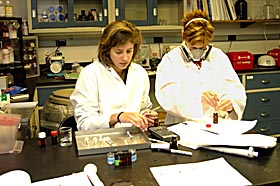|
This is an archived
article. For the latest news, go to the Advance Homepage
For more archives, go to the Advance Archive/Search Page. |
||
|
Gift To Neurosciences Program At 96, Walter E. Hildick is still intrigued by innovation. And he likes to encourage it in others. Recently, he gave $1,000 to establish an award for students in the graduate program in neurosciences at UConn.
To compete for the award, students must submit a proposal outlining a methodological innovation in neuroscience research. This may involve new or modified apparatus, techniques, or methods. The proposal must demonstrate successful application to a research project, as well as a description of potential use by other researchers. Hildick decided to establish the award because "innovation can do much for the common good." Hildick's son-in-law Stephen Maxson is a professor in the psychology department who specializes in behavioral neuroscience. Hildick says his discussions with Maxson about research taking place at UConn convinced him that "the neurosciences can have a wide impact on human behavior and health." Neuroscience is broadly defined as those fields of study involved in understanding how the brain and nervous system work. The "Neurosciences at Storrs" program is jointly sponsored by the departments of physiology and neurobiology, psychology, and pharmaceutical sciences. Students can receive degrees from any of the departments, with a concentration in neuroscience. "Our program is well regarded nationally," notes Maxson, who serves as the chair of the award committee. "We are fortunate to have a very strong cohort of graduate students who are drawn by the exciting research taking place on campus." Neuroscientists at UConn are currently conducting studies into drug therapies and their relationship to Parkinson's disease and schizophrenia; memory and learning; how humans see; and the genetic basis for aggression. This is the first time Hildick has provided financial support for an institution of higher education, but he says he feels it is the perfect way to encourage forward-thinking and to help students "do what they want to do." Hildick, who graduated from MIT as a chemical engineer and managed a number of major textile manufacturing operations in the United States, says innovation has always been a strong motivator in his professional and personal life. Award winners will present their discoveries at a Society of Neurosciences meeting, which takes place each spring on the Storrs campus. The gathering is an opportunity for faculty and students to meet and discuss their research with colleagues from nearby universities and colleges and pharmaceutical companies in the area. Maxson hopes the gift can be turned into an endowment that funds an annual award in perpetuity, through contributions from others interested in the program. If that happens, he says, Hildick's gift can be looked upon as "seed money." "A thousand dollars is a lot of money to a graduate student," Maxson says. "But more importantly, this sort of recognition can encourage graduate students to make major contributions to this field while still at the University of Connecticut." |

